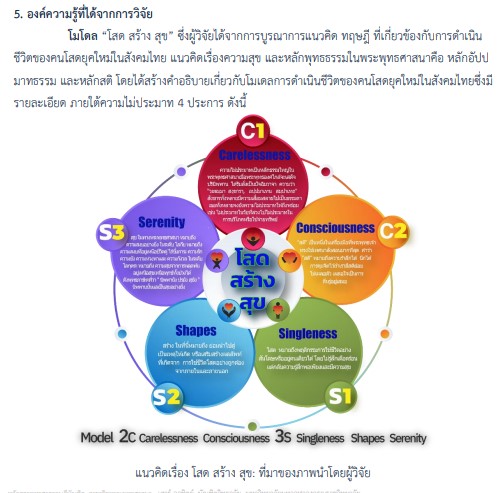THE INNOVATIVE LIFESTYLE OF MODERN SINGLE IN THAI SOCIETY BASED ON BUDDHIST INTEGRATION
Main Article Content
Abstract
This dissertation studies "The Innovative Way of Life for Single Individuals in Thai Society Integrated with Buddhist Principles" and outlines the following objectives: Firstly To investigate the principles and concepts involving the way of life for single individuals. Secondly To examine the Buddhist principles that can be applied to improve the lifestyle of single individuals within Thai society. And thirdly To propose innovative approaches that can improve the lives of single individuals in Thai society by integrating Buddhist philosophy. In summary, we can conclude that two core principles, namely, "carelessness" and "consciousness," which play a fundamental stabilities in life, Carelessness regarding age. Carelessness in spending. Carelessness in maintaining one's mental well-being. The innovation proposed for the lives of single individuals, integrated with Buddhist philosophy in modern Thai society, is termed "Singleness Shapes Serenity." These fundamental principles are the concept that could leads everyone to the ultimate goal, often referred to as "nirvana", the pinnacle of happiness.
Article Details

This work is licensed under a Creative Commons Attribution-NonCommercial-NoDerivatives 4.0 International License.
เรื่องลิขสิทธิ์/เป็นความคิดเห็นของผู้เขียน
References
เอกสารอ้างอิง :
หนังสือ :
พระธรรมปิฎก (ป.อ. ปยุตฺโต). (2546). พจนานุกรมพุทธศาสตร์ ฉบับประมวลธรรม. กรุงเทพมหานคร: มหาจุฬาลงกรณราชวิทยาลัย.
พระพรหมคุณาภรณ์ (ป.อ. ปยุตฺโต). (2540). พจนานุกรมพุทธศาสตร์ ฉบับประมวลธรรม. กรุงเทพมหานคร: มหาจุฬาลงกรณราชวิทยาลัย.
พระธรรมวิสุทธิกวี (พิจิตร ฐิตวณฺโณ). (2558). อุดมมงคลในพระพุทธศาสนา. กรุงเทพมหานคร: วัดโสมนัสวิหาร.
มหาวิทยาลัยมหาจุฬาลงกรณราชวิทยาลัย. (2539). พระไตรปิฎก ภาษาไทยฉบับมหาจุฬาลงกรณราชวิทยาลัย. กรุงเทพมหานคร: โรงพิมพ์มหาจุฬาลงกรณราชวิทยาลัย.
วารสาร :
ภัทราพร ตาสิงห์. (กรกฎาคม-ธันวาคม 2565).ชีวิตที่ออกแบบเองได้ของคนโสดที่อาศัยอยู่ตามลำพัง. วารสารการวิจัยกาสะลอง, 10 (2); 57.
วิทยานิพนธ์ :
ณัฐณิชา สมฤทธิ์.(2561). การบริหารชีวิตของผู้หญิงที่อยู่เป็นโสด. ดุษฎีนิพนธ์สาขาวิชารัฐประศาสนศาสตร์ คณะรัฐศาสตร์. บัณฑิตวิทยาลัย: มหาวิทยาลัยรังสิต.
สื่ออิเล็กทรอนิกส์ :
ฉัตรศรีผ่อง ศิริภักดิ์. “ประสบการด้านจิตใจในการตัดสินใจครองโสดของผู้หญิงไทย”. การประชุมเสนอผลงานระดับชาติ มหาวิทยาลัยสุโขทัยธรรมาธิราช ครั้งที่ 9. (ออนไลน์). แหล่งที่มา www.stou.ac.th. (วันที่สืบค้น 4 เมษายน 2566)
สำนักงานสถิติแห่งชาติ. เปิดสาเหตุ “GEN Y” เน้นเป็นโสด ไม่มีลูก มุ่งทำงานมากขึ้น. (ออนไลน์). แหล่งที่มาจาก www.bangkokbiznews.com. (วันที่สืบค้น 18 กุมภาพันธ์, 2566)
เสถียรพงษ์ วรรณปก. (ออนไลน์). (วันที่สืบค้น 19 เมษายน 2566). แหล่งที่มาwww.matichonweekly.com
G THE GEN C URBAN LIVING SOLUTION BLOG. “ฮาว ทู” อยู่คนเดียวอย่างไรให้มีความสุข. (ออนไลน์). แหล่งที่มาจาก www.ananda.co.th. (วันที่ สืบค้น 22 กมภาพันธ์ 2566)
สัมภาษณ์ :
พระเมธาวินัยรส, รศ.ดร. ผู้เชี่ยวชาญด้านพระพุทธศาสนา. วันที่สัมภาษณ์ 17 กรกฎาคม 2566.
รศ.ดร. ประเวศ อินทองปาน ผู้เชี่ยวชาญด้านพระพุทธศาสนา. วันที่สัมภาษณ์ 2 สิงหาคม 2566.
Reference :
Books :
Phra Dhammapitaka (P.A. Payutto). (2003). Buddhist Dictionary: A Compilation of Dhamma. Bangkok: Mahachulalongkornrajavidyalaya University.
Phra Brahmakhunaporn (P.O. Payutto). (1997). Buddhist Dictionary: A Compilation of Dhamma. Bangkok: Mahachulalongkornrajavidyalaya University.
Phra Tham Wisutthikawi (Phichit Thitawanno). (2015). Supreme Blessings in Buddhism. Bangkok: Wat Sommanat Wihan.
Mahachulalongkornrajavidyalaya University. (1996).Thai Tripitaka Mahachulalongkornrajavidyalaya Edition. Bangkok: Mahachulalongkornrajavidyalaya University Printing House.
Maslow, Abraham H. (1970). Motivation and Personality. New York : Harpers and Row.
Journal :
Pattaraporn Tasingh. (July-December 2022). Self-designed life of single people living alone. Kasalong Research Journal, 10 (2); 57.
Thesis :
Natthanicha Somrit. (2018). Managing the Life of Single Women. Doctoral Dissertation in Public Administration, Faculty of Political Science, Graduate School: Rangsit University.
Electronic media :
Chatsriphong Siriphakdi. “Psychological Experiences in Deciding to Remain Single Among Thai Women.” 9th National Conference on Research Presentation Sukhothai Thammathirat Open University. (Online). Available at www.stou.ac.th. (Accessed
April 4, 2023).
National Statistical Office. Reveals the reasons why "Generation Y" prioritizes being single, childless, and focusing more on work. (Online). Source: www.bangkokbiznews.com. (Accessed February 18, 2023)
Setthipong Wannapak. (Online). (Accessed April 19, 2023). From www.matichonweekly.com
G THE GEN C URBAN LIVING SOLUTION BLOG. “How to” Live Happily While Living Alone. (Online). Source: www.ananda.co.th. (Accessed February 22, 2023)
Interview :
Phra Methawinairos, Associate Professor, Ph.D., expert in Buddhism. (Interview 17 July 2023)
Assoc. Prof. Dr. Prawet Inthongpan, expert in Buddhism. (Interview 2 August 2023)


